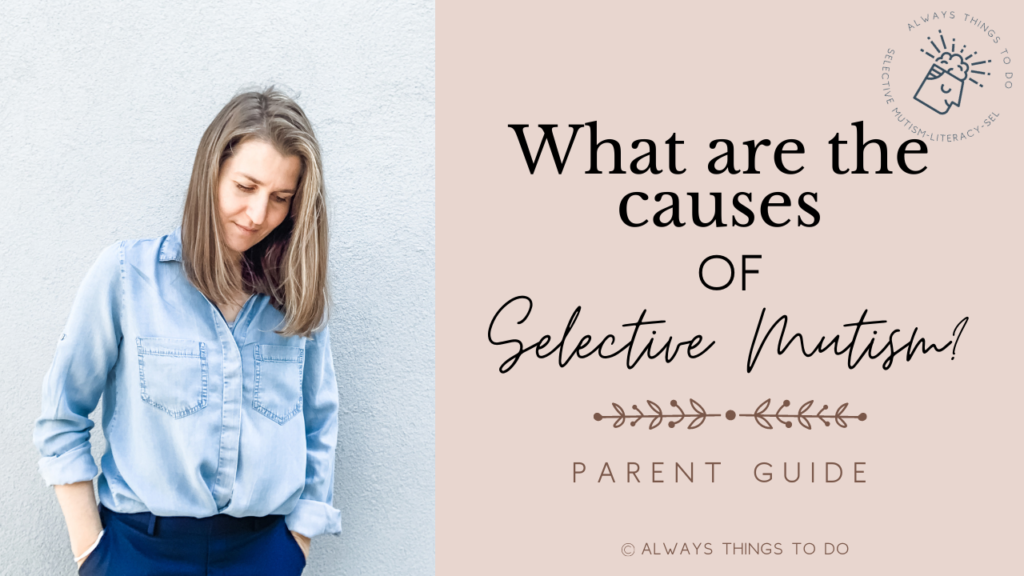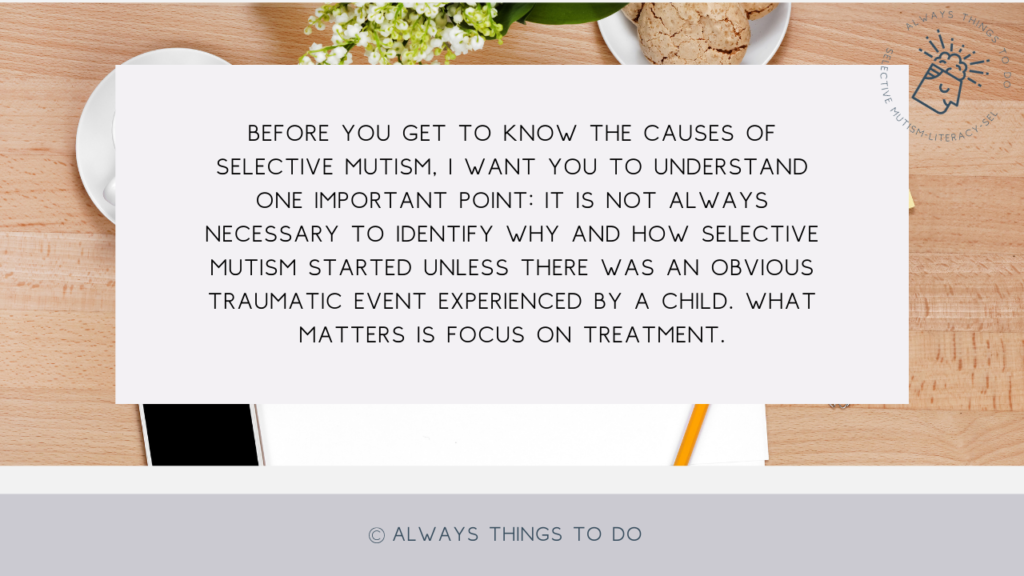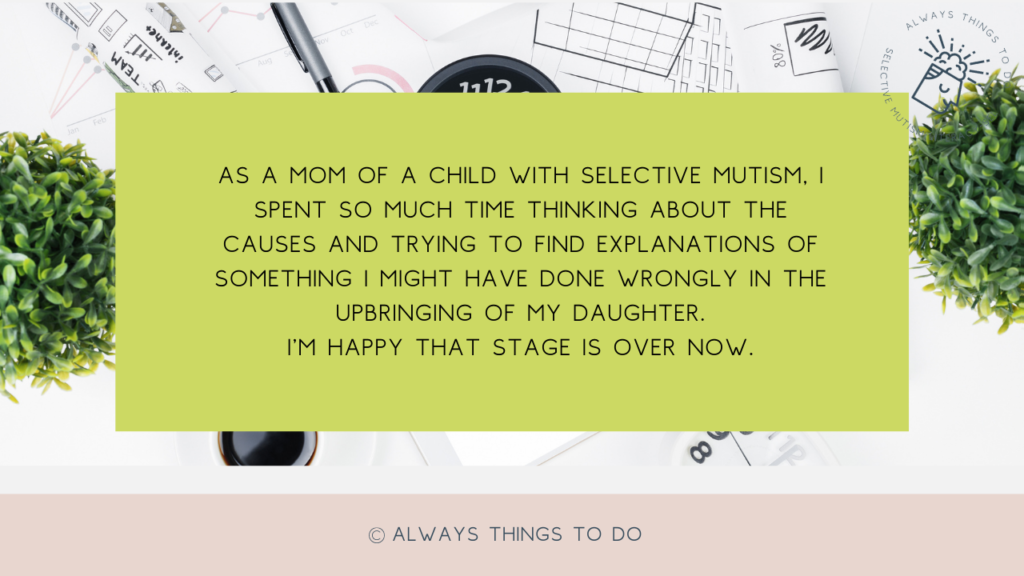What Are The Causes of Selective Mutism?

In this post, you will learn about:
- the three causes of selective mutism,
- what parents should NOT think about,
- what parents should focus on.
When my child was diagnosed with selective mutism, my first question was WHY. Like with any “regular” illness, one may try to find the possible explanation and trackback to the event that caused all the mess.
However, the unfortunate thing about a selective mutism anxiety disorder is that the causes are unknown; they are still being studied. Finally, there may be multiple causes combined rather than one particular trigger that sets selective mutism.
In general, literature on selective mutism talks about three categories that the causes fall into:
- Inhibited temperament/behavioral inhibition
- Genetics
- Environment

Behavioral Inhibition as a Cause of Selective Mutism.
Dr. Elisa Shipon-Blum describes behavioral inhibition as a child’s predisposition for anxiety, which could have been inherited from one of the family members. The signs of behavioral inhibition are:
- separation anxiety
- tantrums
- crying
- moodiness
- inflexibility
- extreme shyness in early years
Among the three categories of selective mutism causes, I believe behavioral inhibition is most likely to be noticed and backtracked only AFTER a child is diagnosed.
In my family, all the signs of behavioral inhabitation in my daughter were present from an early age, even though I did not pay much attention to how these signs pointed to the development of selective mutism.
Tantrums, crying, and moodiness are something many children can have, so as a mom, I have tried to address these issues by bringing social-emotional education to myself and bringing up my child.
Genetics as a Cause of Selective Mutism.
The genetic factor is the most mysterious because one cannot control or change how the parents’ genetic profile will impact a child emotionally.
Families do not talk about the history of anxiety and shyness regularly. Nor is it possible to determine to what extent a parent’s anxiety may impact the child.
All people feel anxious more often than we want, especially when we have tight schedules, stressful jobs, issues, and problems we have to address daily.
Fast-forward a few years, and I can now state I experienced a lot of stress and anxiety when I became a mom, which coincided with getting my first job as a teacher and navigating the daily grind in general.
That it will one day impact my child never crossed my mind. Even if it did, I knew little or almost nothing about meditation, mindfulness nor was I in the place in my life when meditation and reconsidering priorities were at the top of my list.
Environment as a Cause of Selective Mutism.
Finally, the environmental factor relates to the family habits of socializing, exposing a child to peers.
In addition, according to the Selective Mutism Anxiety Research and Treatment Center, a significant proportion of kids with selective mutism come from bilingual /multilingual families, which means that a child is exposed to different cultures and languages. Insecurity about having to speak in a foreign language increases anxiety.
I still haven’t found the answer to whether a different cultural environment and speaking a foreign language contribute to the development of selective mutism or make the existing anxiety more dominant, and therefore, eventually push a child towards selective mutism.
The answer might be both.
Our family does have a connection to different cultures and languages. My daughter’s father speaks Spanish, and my own family speaks Russian.
When my daughter was 2-3 years old, spending time overseas and being exposed to a different culture and language was part of her upbringing.
At three years of age, she was bubbly, fun, understood, and spoke quite a lot of Russian to her grandparents. There was never a visible indication of anxiety that would cause any concern.
The dramatic shift happened at four years old when she stopped talking to her grandparent, gave up speaking Russian, and those signs of temperamental inhibition would show up more frequently.
Sometimes, it feels that a perfect storm is created by many unusual circumstances coming together and fitting in like a perfect puzzle.
Selective mutism seems to function this way as well. Many circumstances contribute to selective mutism.

Causes of Selective Mutism: Parents’ Takeaway.
While it would be almost impossible to foresee these circumstances and factors coming together to create a perfect storm, I believe the transformational power of looking into the causes of selective mutism (behavioral inhibition, genetics, environment) may impact one’s family’s priorities, style of parenting or even push a family into lifestyle changes.
The bottom line is it’s possible to reflect on the cause of selective mutism and backtrack the factors that might have contributed to selective mutism anxiety disorder in your child.
At the same time, trying to pinpoint the causes has nothing to do with selective mutism treatment.
Some children with selective mutism come from monolingual families with no known anxiety cases in their family and where parents provided the best care and upbringing, yet a child developed selective mutism.
What I believe matters is how the knowledge and awareness of causes for selective mutism can impact a family’s priorities in a child’s upbringing and even lifestyle choices.
What you should NOT think about while learning about the causes of selective mutism:
- I was a bad mother/ father for my child.
- My parenting style made my child suffer from selective mutism.
- I cannot do anything with my child’s selective mutism. It just happened.
- My child was traumatized.
- I have made bad choices of pushing my child into speaking other languages.
- We should have had more playdates.
- I should have been a better parent.
What you should focus on while learning about the causes of selective mutism:
- Am I a happy parent?
- Do I allow myself to relax?
- How can my family have a better/ healthier lifestyle?
- Do I compare my child to other children?
- Am I a helicopter parent?
- What can I do to support my child’s social-emotional development?
- How can I address my anxiety?
Learning about selective mutism and its causes has made dramatic shifts in my life, and I believe every family with a selective mutism child has gone through the same route.
Whether you changed your parenting style or embraced meditation and mindfulness, or maybe you have dramatically changed your life and job priorities, the changes, my friend, are for the better, not only for your child but for you too.
To learn more about the symptoms and most commonly asked questions about treatment, school interventions, and diagnosis, read the “What is selective mutism?” article written from the parent’s perspective.
To learn about a family’s journey, addressing crisis and fear, read “Selective Mutism: How to Beat Crisis, Screaming, Fear.”
Explore the expanding library of tools. Go to the selective mutism page and scroll to the bottom section, “Recent Projects.”
Don’t forget to connect with me on social media @alwaysthingstodo.


